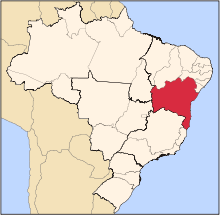Bahia Emerald
The Bahia Emerald is one of the largest emeralds and contains the largest single shard ever found. The stone, weighing approximately 840lbs (381kg) (containing more than 180,000 carats) originated from Bahia, Brazil and is emerald crystals embedded in host rock. It narrowly escaped flooding during Hurricane Katrina in 2005 during a period of storage in a warehouse in New Orleans.[1] It was subsequently reported stolen in September 2008 from a secured vault in South El Monte in Los Angeles County, California.[2] The stone has been valued at some $400 million, but the true value is unclear. At one point, the emerald was listed for sale on eBay for a "Buy It Now" price of $75 million.[2]
History
It originally was mined in the beryl mines of north Bahia, Brazil, from which it takes its name. Bahia is an archaic form of Portuguese baía, meaning 'bay' after the bay first seen by European explorers in the 16th century.

After being moved from Brazil to the United States, various attempts were made to sell it without success. There were conflicting claims of ownership. Eventually the emerald was seized from a gem dealer in Las Vegas and taken into the custody of the Los Angeles Sheriff's Department. After a series of legal actions, Judge John A. Kronstadt of the Los Angeles County Superior Court announced in September 2010 that he would hear the case.[1][3] Anthony Thomas, among the claimants, claimed to have original ownership of the gem including claimants who have paid more than $1.3 million for the emerald.[3] A trial date was set for January 21, 2013, in the Los Angeles County Court. On January 29, 2014, Judge Kronstadt issued a ruling rejecting the claims of Anthony Thomas, leaving the determination of the remaining claimants for a future trial.[4] Mr. Thomas subsequently filed bankruptcy to discharge the costs and attorney fees he incurred in his failed attempt to claim the Bahia Emerald as his own. Mr. Thomas' appeal from the ruling against him was later dismissed because Thomas failed to pursue the appeal in a timely fashion.
After a trial on March 30, 2015 in the Los Angeles Superior Court, the Honorable Michael Johnson, the judge who succeeded Judge Kronstadt in the civil case, entered a final order on June 23, 2015 determining and ruling that FM Holdings, LLC was the bona fide purchaser of the Bahia Emerald and that title to the Bahia Emerald is now held solely and exclusively by FM Holdings, LLC by a series of agency relationships and lawful transactions. All other claimants to the Bahia Emerald have either been previously dismissed, e.g., Tony Thomas, or settled their claims leaving FM Holdings, LLC, as the sole and exclusive owner of the Bahia Emerald by Judge Johnson's June 23, 2015 ruling.
On June 25, 2015, U.S. District Court Judge Colleen Kollar-Kotelly, on a request by the Department of Justice, issued a restraining order protecting the stone, arguing that it is subject to forfeiture in Brazil, where prosecutors in an upcoming criminal trial allege that two men knowingly received the stolen emerald and illegally smuggled it out of the country.[5]
External links
- Borrell, Brendan (March 6, 2015). "The Long, Strange Saga of the 180,000-Carat Emerald - Bloomberg Business". Bloomberg L.P.
References
- 1 2 Allen, Nick (September 24, 2010). "Judge to decide who owns 250 million Bahia emerald.html". The Daily Telegraph, UK. Retrieved December 31, 2010.
- 1 2 "850-pound emerald at center of dispute". CNN.com. December 27, 2008. Retrieved December 31, 2010.
- 1 2 "Custody battle for giant emerald". MSN. September 24, 2010. Archived from the original on September 28, 2010. Retrieved December 31, 2010.
- ↑ "Judge rejects businessman's claim to $372M emerald". MSN News. January 30, 2014. Archived from the original on February 1, 2014. Retrieved January 30, 2014.
- ↑ Ceasar, Stephen (June 25, 2015). "Federal judge halts release of massive Brazilian emerald". latimes.com. Timothy E. Ryan. Retrieved October 16, 2015.
On Thursday, a federal judge ordered that the stone remain under lock and key, barring anyone, including those who won their claim to the stone, from moving or even seeing it.